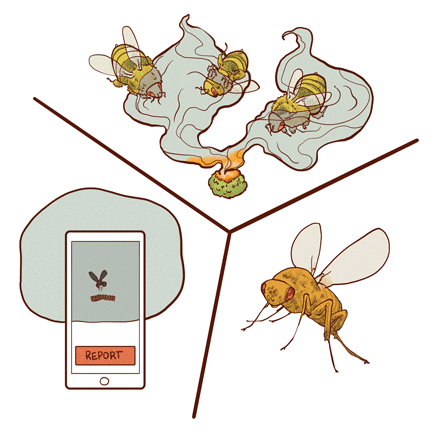In the world of insect science, some interesting news has surfaced regarding beekeepers using bees to create cannabis honey, the use of an app to help combat the Zika virus, and the fluid gender of fruit flies.
Bees with a higher purpose
A beekeeper in France has invented what he calls “cannahoney”: an all-natural, cannabis-infused honey straight from the honeycomb.
Whether it’s through gum, candy, or brownies, the typical marijuana-laced edible is made when raw cannabis flowers are cooked down into an oil or butter and then subsequently added to a regular recipe. What beekeeper Nick Trainerbees (formerly Trainer) has done here is create a naturally-made edible.
“For some time I had known about the health benefits of bee products such as honey, propolis, pollen, wax, and royal jelly, and also about the benefits of cannabis,” Trainerbees explained to Alternet.
“Everything that passes through the body of a bee is improved.”
While Trainerbees has not revealed explicit details on his methods, he explains that over a 20-year period the bees have been trained by him to collect sugar from fruits, rather than from flowers. With this new behaviour, Trainerbees transitioned the bees to collect the resin from marijuana plants.
When bees get nectar from resin in trees, the resin is converted via enzymes in the bee’s body to propolis, which is an antibiotic and antiseptic with a long list of beneficial qualities. Trainerbee’s goal was to observe what propolis made with marijuana resin would produce.
The project began in 2006, and it has resulted in cannahoney, a thick, brightly colored honey that has a floral taste. The color ranges from a mild green to a bright yellow.
The project was not immediately a success. In fact, Trainerbees spent two years proving through demonstrations that the process would not harm the bees before he continued, amidst allegations that the cannabis might be hurting the bees, or “getting them high.”
“The bees that produce the cannahoney are not affected by cannabinoids because they do not have an endocannabinoid system,” Trainerbees explained.
“It’s just another form of food for them.”
Trainerbees, who has self-medicated with marijuana for his hyperactivity since he was 10, already has fans, with over 11,000 Facebook followers and 4,500 Instagram followers.
While no official testing has happened yet, he says that cannahoney has already shown to improve anxiety in the few people who have tried it. He is planning to move to Spain from the U.S., where he is currently located, on account of their more relaxed view of marijuana usage.
Fighting the Zika virus with smartphones
The Zika virus threat has been called an epidemic by experts. Residents in Brazil are now taking the fight against the virus into their own hands through the use of a smartphone app.
The app is called Sem Dengue, which translates from Portugese to Without Dengue, and functions as a way to alert authorities of stagnant water which can attract mosquitos.
The user takes a picture of the water, sends it through the app, and with the use of a geo-locater, alerts the authorities of its whereabouts. Experts are then sent out to deal with the water.
The Zika virus is spread by the Aedes mosquito. Its symptoms are relatively mild, such as headaches and joint pain, but can result in serious complications.
Pregnant women have the highest risk, as connections have been found between the Zika virus and microcephaly in infected babies. The virus has been found mainly in Africa, South and Central America, Asia, and the Pacific. There is no vaccine to combat it thus far.
Niterói, a Brazilian city of 490,000, has had 4,976 reported cases of microcephaly due to the Zika virus so far. Mayor Rodrigo Neves says that the app has been very helpful in the city’s struggle to remove breeding grounds for potentially Zika-carrying mosquitos.
“I think the ‘Without Dengue’ app is without a doubt quite a successful strategy to mobilize the local community for the fight against [mosquitos],” Neves said in a news release.
According to the mayor, the app has generated hundreds of responses.
Over two dozen cities in Brazil are using the app to help combat the virus.
Civilian awareness in Brazil is an important factor in stopping the Zika virus. According to some residents, many Brazilians are misinformed about just how broad the Zika-carrying mosquito’s living space is.
Carnaval, a six-day national celebration marked with loud music, elaborate costumes, and a whole lot of physical connections, continued in early February despite the health scare.
Fruit flies alter sexuality based on socialization
Recent studies have shown that the sexuality of fruit flies is connected to how they socialize.
Researchers at Tohoku University in Japan have published a study in the journal Nature Communications that states that the sexuality of male fruit flies can be affected by a mutant gene.
“The neurons that express the fruitless (fru) gene basically govern the whole aspect of male sexual behavior,” said Daisuke Yamamoto, one of the two researchers of the study.
Fruit flies with the mutated gene were only interested in pursuing male fruit flies, and completely ignore female ones.
The connection between socialization and a mutated gene lies in the fact that the sexual behaviour of the mutated fruit fly seems to only manifest itself when the fly is reared in a group.
Fruit flies who were raised alone straight from the pupa stage did not display any different sexual characteristics.


